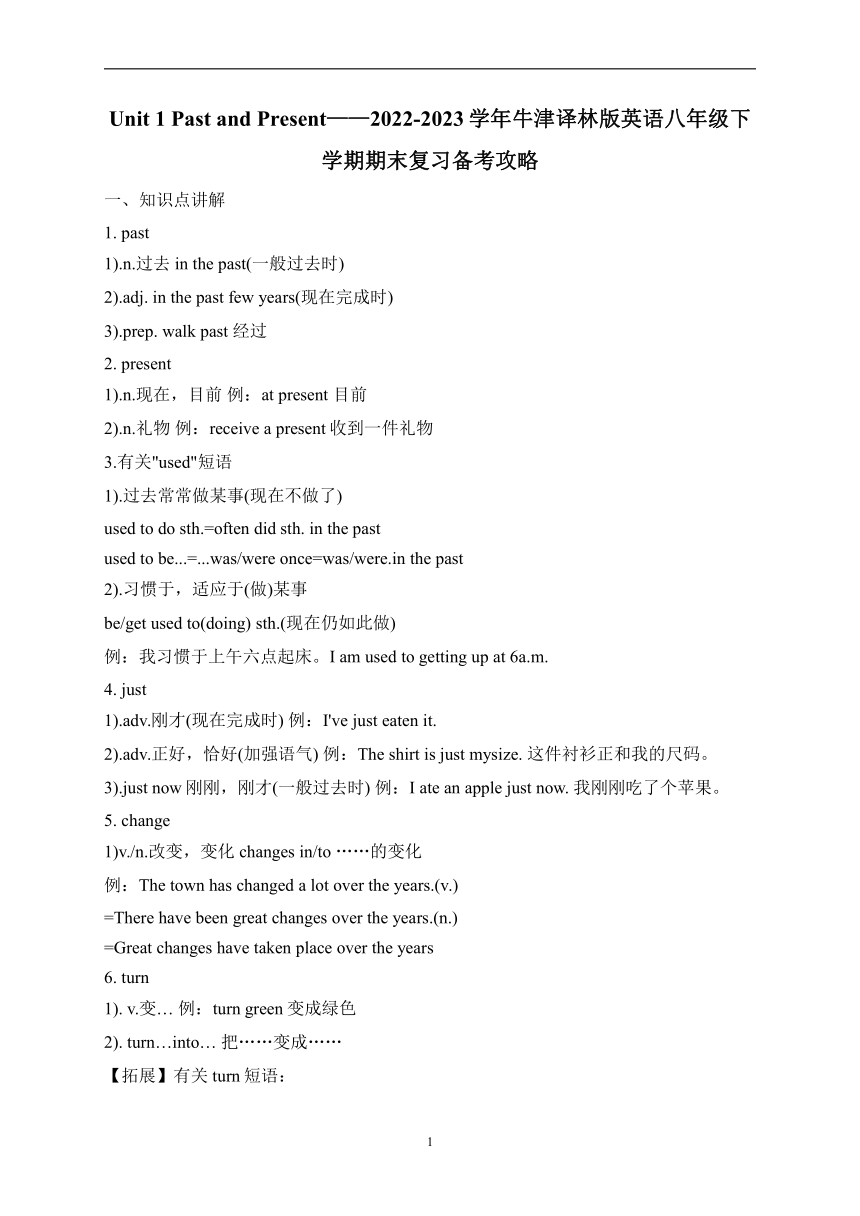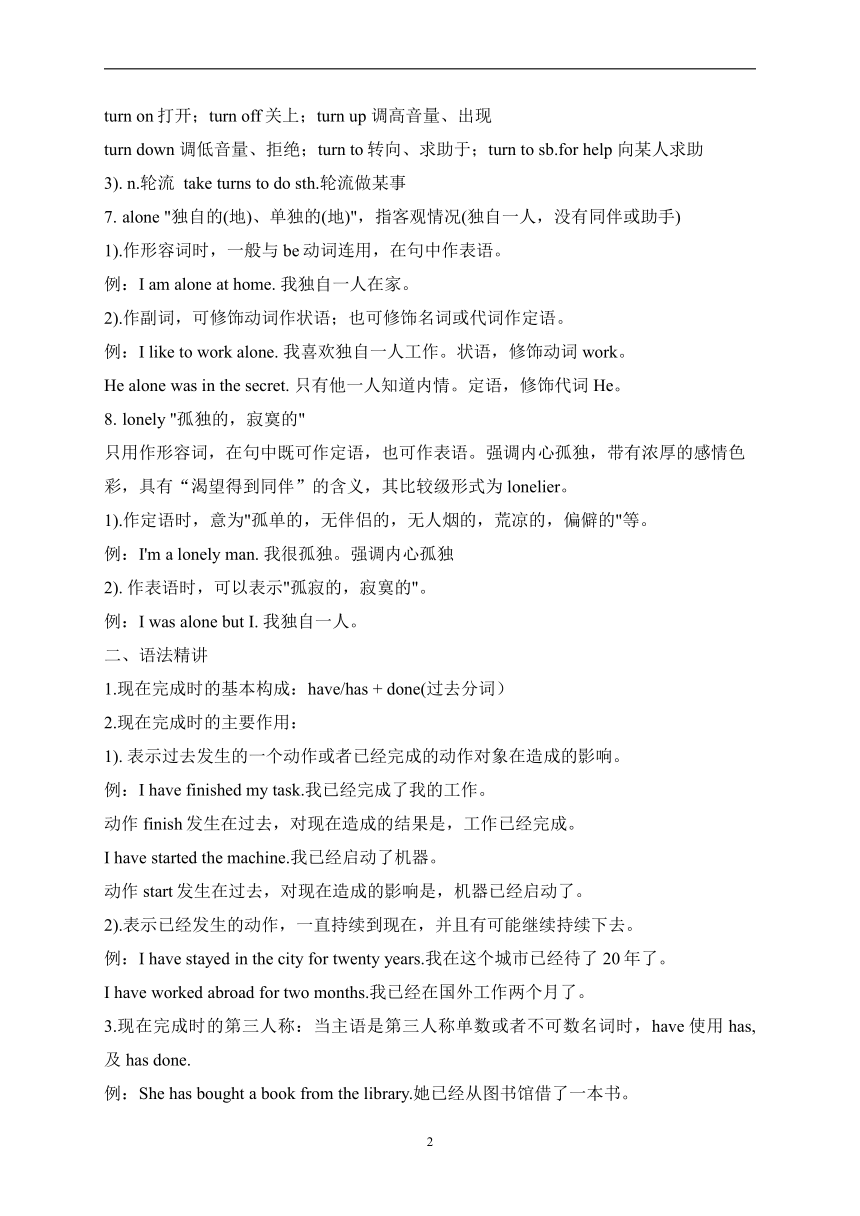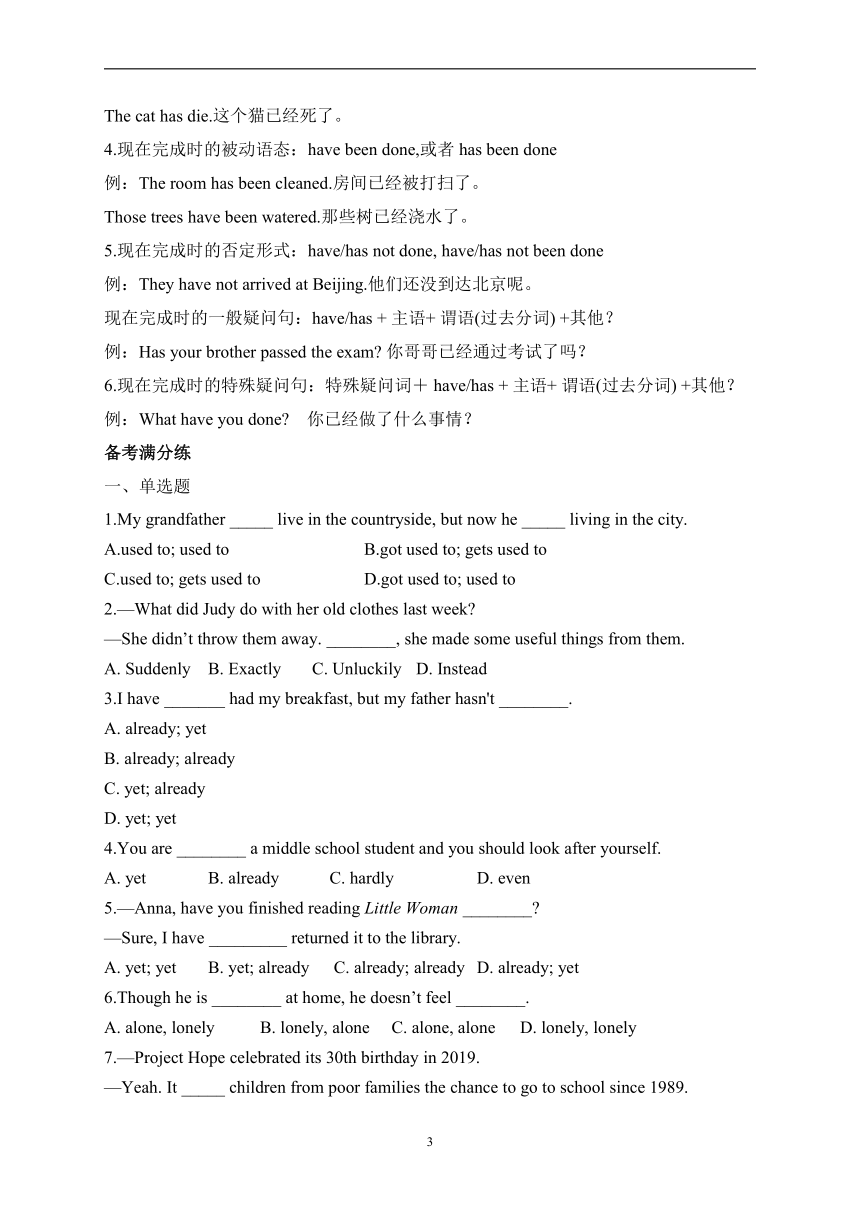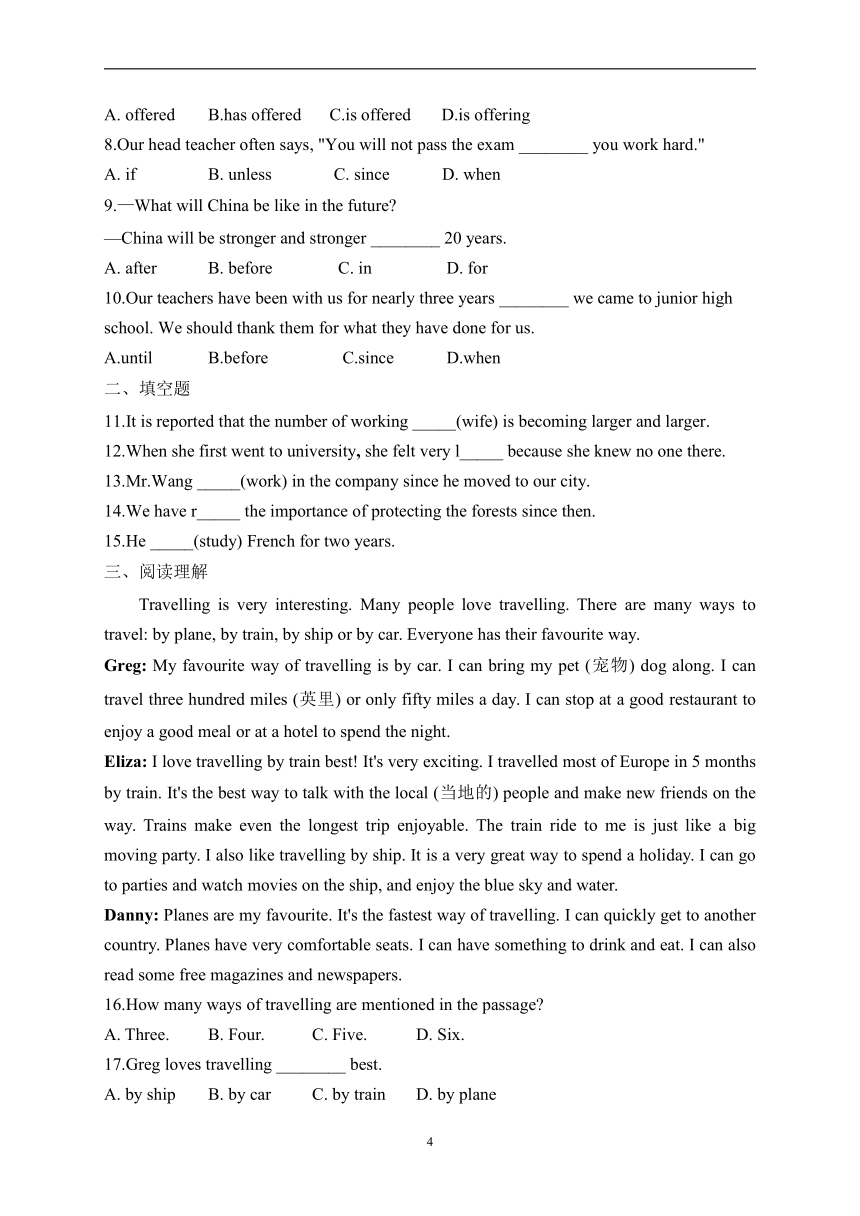Unit 1 Past and Present ——2022-2023学年牛津译林版英语八年级下学期期末复习备考攻略(含解析)
文档属性
| 名称 | Unit 1 Past and Present ——2022-2023学年牛津译林版英语八年级下学期期末复习备考攻略(含解析) |  | |
| 格式 | docx | ||
| 文件大小 | 29.4KB | ||
| 资源类型 | 教案 | ||
| 版本资源 | 牛津译林版 | ||
| 科目 | 英语 | ||
| 更新时间 | 2023-06-18 16:17:34 | ||
图片预览




文档简介
Unit 1 Past and Present——2022-2023学年牛津译林版英语八年级下学期期末复习备考攻略
一、知识点讲解
1. past
1).n.过去in the past(一般过去时)
2).adj. in the past few years(现在完成时)
3).prep. walk past 经过
2. present
1).n.现在,目前 例:at present 目前
2).n.礼物 例:receive a present收到一件礼物
3.有关"used"短语
1).过去常常做某事(现在不做了)
used to do sth.=often did sth. in the past
used to be...=...was/were once=was/were.in the past
2).习惯于,适应于(做)某事
be/get used to(doing) sth.(现在仍如此做)
例:我习惯于上午六点起床。I am used to getting up at 6a.m.
4. just
1).adv.刚才(现在完成时) 例:I've just eaten it.
2).adv.正好,恰好(加强语气) 例:The shirt is just mysize. 这件衬衫正和我的尺码。
3).just now刚刚,刚才(一般过去时) 例:I ate an apple just now. 我刚刚吃了个苹果。
5. change
1)v./n.改变,变化changes in/to ……的变化
例:The town has changed a lot over the years.(v.)
=There have been great changes over the years.(n.)
=Great changes have taken place over the years
6. turn
1). v.变… 例:turn green变成绿色
2). turn…into… 把……变成……
【拓展】有关turn短语:
turn on打开;turn off关上;turn up 调高音量、出现
turn down 调低音量、拒绝;turn to转向、求助于;turn to sb.for help 向某人求助
3). n.轮流 take turns to do sth.轮流做某事
7. alone "独自的(地)、单独的(地)",指客观情况(独自一人,没有同伴或助手)
1).作形容词时,一般与be动词连用,在句中作表语。
例:I am alone at home. 我独自一人在家。
2).作副词,可修饰动词作状语;也可修饰名词或代词作定语。
例:I like to work alone. 我喜欢独自一人工作。状语,修饰动词work。
He alone was in the secret. 只有他一人知道内情。定语,修饰代词He。
8. lonely "孤独的,寂寞的"
只用作形容词,在句中既可作定语,也可作表语。强调内心孤独,带有浓厚的感彩,具有“渴望得到同伴”的含义,其比较级形式为lonelier。
1).作定语时,意为"孤单的,无伴侣的,无人烟的,荒凉的,偏僻的"等。
例:I'm a lonely man. 我很孤独。强调内心孤独
2). 作表语时,可以表示"孤寂的,寂寞的"。
例:I was alone but I. 我独自一人。
二、语法精讲
1.现在完成时的基本构成:have/has + done(过去分词)
2.现在完成时的主要作用:
1). 表示过去发生的一个动作或者已经完成的动作对象在造成的影响。
例:I have finished my task.我已经完成了我的工作。
动作finish发生在过去,对现在造成的结果是,工作已经完成。
I have started the machine.我已经启动了机器。
动作start发生在过去,对现在造成的影响是,机器已经启动了。
2).表示已经发生的动作,一直持续到现在,并且有可能继续持续下去。
例:I have stayed in the city for twenty years.我在这个城市已经待了20年了。
I have worked abroad for two months.我已经在国外工作两个月了。
3.现在完成时的第三人称:当主语是第三人称单数或者不可数名词时,have使用has, 及has done.
例:She has bought a book from the library.她已经从图书馆借了一本书。
The cat has die.这个猫已经死了。
4.现在完成时的被动语态:have been done,或者has been done
例:The room has been cleaned.房间已经被打扫了。
Those trees have been watered.那些树已经浇水了。
5.现在完成时的否定形式:have/has not done, have/has not been done
例:They have not arrived at Beijing.他们还没到达北京呢。
现在完成时的一般疑问句:have/has + 主语+ 谓语(过去分词) +其他?
例:Has your brother passed the exam 你哥哥已经通过考试了吗?
6.现在完成时的特殊疑问句:特殊疑问词+ have/has + 主语+ 谓语(过去分词) +其他?
例:What have you done 你已经做了什么事情?
备考满分练
一、单选题
1.My grandfather _____ live in the countryside, but now he _____ living in the city.
A.used to; used to B.got used to; gets used to
C.used to; gets used to D.got used to; used to
2.—What did Judy do with her old clothes last week
—She didn’t throw them away. ________, she made some useful things from them.
A. Suddenly B. Exactly C. Unluckily D. Instead
3.I have _______ had my breakfast, but my father hasn't ________.
A. already; yet
B. already; already
C. yet; already
D. yet; yet
4.You are ________ a middle school student and you should look after yourself.
A. yet B. already C. hardly D. even
5.—Anna, have you finished reading Little Woman ________
—Sure, I have _________ returned it to the library.
A. yet; yet B. yet; already C. already; already D. already; yet
6.Though he is ________ at home, he doesn’t feel ________.
A. alone, lonely B. lonely, alone C. alone, alone D. lonely, lonely
7.—Project Hope celebrated its 30th birthday in 2019.
—Yeah. It _____ children from poor families the chance to go to school since 1989.
A. offered B.has offered C.is offered D.is offering
8.Our head teacher often says, "You will not pass the exam ________ you work hard."
A. if B. unless C. since D. when
9.—What will China be like in the future
—China will be stronger and stronger ________ 20 years.
A. after B. before C. in D. for
10.Our teachers have been with us for nearly three years ________ we came to junior high school. We should thank them for what they have done for us.
A.until B.before C.since D.when
二、填空题
11.It is reported that the number of working _____(wife) is becoming larger and larger.
12.When she first went to university, she felt very l_____ because she knew no one there.
13.Mr.Wang _____(work) in the company since he moved to our city.
14.We have r_____ the importance of protecting the forests since then.
15.He _____(study) French for two years.
三、阅读理解
Travelling is very interesting. Many people love travelling. There are many ways to travel: by plane, by train, by ship or by car. Everyone has their favourite way.
Greg: My favourite way of travelling is by car. I can bring my pet (宠物) dog along. I can travel three hundred miles (英里) or only fifty miles a day. I can stop at a good restaurant to enjoy a good meal or at a hotel to spend the night.
Eliza: I love travelling by train best! It's very exciting. I travelled most of Europe in 5 months by train. It's the best way to talk with the local (当地的) people and make new friends on the way. Trains make even the longest trip enjoyable. The train ride to me is just like a big moving party. I also like travelling by ship. It is a very great way to spend a holiday. I can go to parties and watch movies on the ship, and enjoy the blue sky and water.
Danny: Planes are my favourite. It's the fastest way of travelling. I can quickly get to another country. Planes have very comfortable seats. I can have something to drink and eat. I can also read some free magazines and newspapers.
16.How many ways of travelling are mentioned in the passage
A. Three. B. Four. C. Five. D. Six.
17.Greg loves travelling ________ best.
A. by ship B. by car C. by train D. by plane
18.What does Eliza think of travelling by train
A. Comfortable. B. Slow. C. Boring. D. Exciting.
19.Danny likes travelling by plane because ________.
A. he likes planes very much B. he can make new friends
C. it's the fastest way D. he likes the blue sky
20.Which of the following is TRUE according to the passage
A. Greg hopes to bring his pet dog along when travelling.
B. Eliza thinks the car ride is just like a moving party.
C. Eliza travelled most of Europe by ship.
D. Danny often sleeps when travelling.
答案以及解析
一、单选题
1.答案:C
解析:考查词组辨析。句意:我祖父过去住在乡下, 但现在他已习惯于住在城里了。used to do sth. 过去常常做某事; get used to doing sth. 习惯于做某事。结合句意可知,C项符合题意。故选C。
2.答案:D
解析:考查副词辨析。句意:—朱迪上周怎么处理她的旧衣服了? —她没有把它们扔掉。相反,她用它们做了一些有用的东西。suddenly突然;exactly确切地;unluckily不幸地;instead反而,代替。根据"She didn't throw them away"以及"she made some useful things from them"可推知,前后两句意思发生转折,即她没有扔掉旧衣服,反而用它们做了一些有用的东西。故选D。
3.答案:A
解析:考查副词辨析。句意:我已经吃过早餐了,但是我爸爸还没有。Already"已经",用于肯定句中;yet"仍然,还",用于否定句或一般疑问句。根据"I have ... had my breakfast"可知,该句为肯定句,应用already;再根据"my father hasn't ..."可知,此处为否定句,应用yet。故选A。
4.答案:B
解析:考查副词辨析。句意:你已经是一个中学生了,你应该照顾你自己。yet还,用于否定句和疑问句;already已经,用于肯定句;hardly几乎不,否定意义;even甚至。根据"you should look after yourself"可知,此处表达的是你已经是一个中学生了。already符合题意。故选B。
5.答案:B
解析:考查副词辨析。句意:—安娜,你读完《小妇人》了吗?—当然,我已经把它还给了图书馆。already已经,一般用于肯定句中;yet还,一般用于否定句和疑问句。第一句是疑问句,应用yet;第二句是肯定句,应用already。故选B。
6.答案:A
解析:考查形容词辨析。句意:尽管他独自在家,但是他不感觉孤独。alone形容词,独自的,侧重说独自一人,没有感彩,只表示客观的状态;lonely形容词,孤独的,表示主观上孤独寂寞,有较强的感彩。分析句意可知,第一空表示他独自一人,不带感彩,用alone;第二空表示不感到孤独,带感彩,用lonely。故选A。
7.答案:B
解析:考查动词时态。句意: —希望工程在2019年庆祝了它的30岁生日。—是的。自从1989年起,它给贫困家庭的孩子们提供去上学的机会。根据"since 1989"可知,应用现在完成时。故选B。
8.答案:B
解析:考查连词辨析。句意:我们的班主任经常说:除非你努力学习,否则你不会通过考试。if如果;unless除非,如果不;since自从;when当……时候。根据"You will not pass the exam .. .you work hard."可知此处是指如果你不努力学习,就不会通过考试。故选B。
9.答案:C
解析:考查介词辨析。句意:——未来的中国会是什么样子?——中国将在20年内变得越来越强大。after在……之后;before在……之前;in在……以后;for后接一段时间。in+一段时间,与一般将来时连用。故选C。
10.答案:C
解析:句意:自从我们上初中, 老师们已经和我们在一起差不多三年时间了。我们应该感谢他们为我们所做的事。考查连词辨析。until"直到……才"; before"在……之前"; since"自从"; when"当……时"。主句的时态是现在完成时, 结合句意,此处表"自从", "since"引导时间状语从句时,主语为现在完成时。故选C。
二、填空题
11.答案:wives
12.答案:lonely
13.答案:has worked
14.答案:realized
15.答案:has studied
三、阅读理解
16.答案:B
解析:细节理解题。根据"by plane, by train, by ship or by car"可知,文章一共提到了坐飞机、坐火车、坐船以及坐小汽车四种方式。故选B。
17.答案:B
解析:细节理解题。根据"Greg: My favourite way of travelling is by car"可知,Greg最喜欢的旅行方式是开车。故选B。
18.答案:D
解析:细节理解题。根据"Eliza: I love travelling by train best! It's very exciting"可知,Eliza认为坐火车旅行让人很兴奋。故选D。
19.答案:C
解析:细节理解题。根据"Planes are my favourite. It's the fastest way of travelling"可知,他认为坐飞机是最快的旅行方式。故选C。
20.答案:A
解析:细节理解题。根据"I can bring my pet (宠物) dog along"可知,Greg希望在旅行时能带着他的宠物狗。故选A。
2
一、知识点讲解
1. past
1).n.过去in the past(一般过去时)
2).adj. in the past few years(现在完成时)
3).prep. walk past 经过
2. present
1).n.现在,目前 例:at present 目前
2).n.礼物 例:receive a present收到一件礼物
3.有关"used"短语
1).过去常常做某事(现在不做了)
used to do sth.=often did sth. in the past
used to be...=...was/were once=was/were.in the past
2).习惯于,适应于(做)某事
be/get used to(doing) sth.(现在仍如此做)
例:我习惯于上午六点起床。I am used to getting up at 6a.m.
4. just
1).adv.刚才(现在完成时) 例:I've just eaten it.
2).adv.正好,恰好(加强语气) 例:The shirt is just mysize. 这件衬衫正和我的尺码。
3).just now刚刚,刚才(一般过去时) 例:I ate an apple just now. 我刚刚吃了个苹果。
5. change
1)v./n.改变,变化changes in/to ……的变化
例:The town has changed a lot over the years.(v.)
=There have been great changes over the years.(n.)
=Great changes have taken place over the years
6. turn
1). v.变… 例:turn green变成绿色
2). turn…into… 把……变成……
【拓展】有关turn短语:
turn on打开;turn off关上;turn up 调高音量、出现
turn down 调低音量、拒绝;turn to转向、求助于;turn to sb.for help 向某人求助
3). n.轮流 take turns to do sth.轮流做某事
7. alone "独自的(地)、单独的(地)",指客观情况(独自一人,没有同伴或助手)
1).作形容词时,一般与be动词连用,在句中作表语。
例:I am alone at home. 我独自一人在家。
2).作副词,可修饰动词作状语;也可修饰名词或代词作定语。
例:I like to work alone. 我喜欢独自一人工作。状语,修饰动词work。
He alone was in the secret. 只有他一人知道内情。定语,修饰代词He。
8. lonely "孤独的,寂寞的"
只用作形容词,在句中既可作定语,也可作表语。强调内心孤独,带有浓厚的感彩,具有“渴望得到同伴”的含义,其比较级形式为lonelier。
1).作定语时,意为"孤单的,无伴侣的,无人烟的,荒凉的,偏僻的"等。
例:I'm a lonely man. 我很孤独。强调内心孤独
2). 作表语时,可以表示"孤寂的,寂寞的"。
例:I was alone but I. 我独自一人。
二、语法精讲
1.现在完成时的基本构成:have/has + done(过去分词)
2.现在完成时的主要作用:
1). 表示过去发生的一个动作或者已经完成的动作对象在造成的影响。
例:I have finished my task.我已经完成了我的工作。
动作finish发生在过去,对现在造成的结果是,工作已经完成。
I have started the machine.我已经启动了机器。
动作start发生在过去,对现在造成的影响是,机器已经启动了。
2).表示已经发生的动作,一直持续到现在,并且有可能继续持续下去。
例:I have stayed in the city for twenty years.我在这个城市已经待了20年了。
I have worked abroad for two months.我已经在国外工作两个月了。
3.现在完成时的第三人称:当主语是第三人称单数或者不可数名词时,have使用has, 及has done.
例:She has bought a book from the library.她已经从图书馆借了一本书。
The cat has die.这个猫已经死了。
4.现在完成时的被动语态:have been done,或者has been done
例:The room has been cleaned.房间已经被打扫了。
Those trees have been watered.那些树已经浇水了。
5.现在完成时的否定形式:have/has not done, have/has not been done
例:They have not arrived at Beijing.他们还没到达北京呢。
现在完成时的一般疑问句:have/has + 主语+ 谓语(过去分词) +其他?
例:Has your brother passed the exam 你哥哥已经通过考试了吗?
6.现在完成时的特殊疑问句:特殊疑问词+ have/has + 主语+ 谓语(过去分词) +其他?
例:What have you done 你已经做了什么事情?
备考满分练
一、单选题
1.My grandfather _____ live in the countryside, but now he _____ living in the city.
A.used to; used to B.got used to; gets used to
C.used to; gets used to D.got used to; used to
2.—What did Judy do with her old clothes last week
—She didn’t throw them away. ________, she made some useful things from them.
A. Suddenly B. Exactly C. Unluckily D. Instead
3.I have _______ had my breakfast, but my father hasn't ________.
A. already; yet
B. already; already
C. yet; already
D. yet; yet
4.You are ________ a middle school student and you should look after yourself.
A. yet B. already C. hardly D. even
5.—Anna, have you finished reading Little Woman ________
—Sure, I have _________ returned it to the library.
A. yet; yet B. yet; already C. already; already D. already; yet
6.Though he is ________ at home, he doesn’t feel ________.
A. alone, lonely B. lonely, alone C. alone, alone D. lonely, lonely
7.—Project Hope celebrated its 30th birthday in 2019.
—Yeah. It _____ children from poor families the chance to go to school since 1989.
A. offered B.has offered C.is offered D.is offering
8.Our head teacher often says, "You will not pass the exam ________ you work hard."
A. if B. unless C. since D. when
9.—What will China be like in the future
—China will be stronger and stronger ________ 20 years.
A. after B. before C. in D. for
10.Our teachers have been with us for nearly three years ________ we came to junior high school. We should thank them for what they have done for us.
A.until B.before C.since D.when
二、填空题
11.It is reported that the number of working _____(wife) is becoming larger and larger.
12.When she first went to university, she felt very l_____ because she knew no one there.
13.Mr.Wang _____(work) in the company since he moved to our city.
14.We have r_____ the importance of protecting the forests since then.
15.He _____(study) French for two years.
三、阅读理解
Travelling is very interesting. Many people love travelling. There are many ways to travel: by plane, by train, by ship or by car. Everyone has their favourite way.
Greg: My favourite way of travelling is by car. I can bring my pet (宠物) dog along. I can travel three hundred miles (英里) or only fifty miles a day. I can stop at a good restaurant to enjoy a good meal or at a hotel to spend the night.
Eliza: I love travelling by train best! It's very exciting. I travelled most of Europe in 5 months by train. It's the best way to talk with the local (当地的) people and make new friends on the way. Trains make even the longest trip enjoyable. The train ride to me is just like a big moving party. I also like travelling by ship. It is a very great way to spend a holiday. I can go to parties and watch movies on the ship, and enjoy the blue sky and water.
Danny: Planes are my favourite. It's the fastest way of travelling. I can quickly get to another country. Planes have very comfortable seats. I can have something to drink and eat. I can also read some free magazines and newspapers.
16.How many ways of travelling are mentioned in the passage
A. Three. B. Four. C. Five. D. Six.
17.Greg loves travelling ________ best.
A. by ship B. by car C. by train D. by plane
18.What does Eliza think of travelling by train
A. Comfortable. B. Slow. C. Boring. D. Exciting.
19.Danny likes travelling by plane because ________.
A. he likes planes very much B. he can make new friends
C. it's the fastest way D. he likes the blue sky
20.Which of the following is TRUE according to the passage
A. Greg hopes to bring his pet dog along when travelling.
B. Eliza thinks the car ride is just like a moving party.
C. Eliza travelled most of Europe by ship.
D. Danny often sleeps when travelling.
答案以及解析
一、单选题
1.答案:C
解析:考查词组辨析。句意:我祖父过去住在乡下, 但现在他已习惯于住在城里了。used to do sth. 过去常常做某事; get used to doing sth. 习惯于做某事。结合句意可知,C项符合题意。故选C。
2.答案:D
解析:考查副词辨析。句意:—朱迪上周怎么处理她的旧衣服了? —她没有把它们扔掉。相反,她用它们做了一些有用的东西。suddenly突然;exactly确切地;unluckily不幸地;instead反而,代替。根据"She didn't throw them away"以及"she made some useful things from them"可推知,前后两句意思发生转折,即她没有扔掉旧衣服,反而用它们做了一些有用的东西。故选D。
3.答案:A
解析:考查副词辨析。句意:我已经吃过早餐了,但是我爸爸还没有。Already"已经",用于肯定句中;yet"仍然,还",用于否定句或一般疑问句。根据"I have ... had my breakfast"可知,该句为肯定句,应用already;再根据"my father hasn't ..."可知,此处为否定句,应用yet。故选A。
4.答案:B
解析:考查副词辨析。句意:你已经是一个中学生了,你应该照顾你自己。yet还,用于否定句和疑问句;already已经,用于肯定句;hardly几乎不,否定意义;even甚至。根据"you should look after yourself"可知,此处表达的是你已经是一个中学生了。already符合题意。故选B。
5.答案:B
解析:考查副词辨析。句意:—安娜,你读完《小妇人》了吗?—当然,我已经把它还给了图书馆。already已经,一般用于肯定句中;yet还,一般用于否定句和疑问句。第一句是疑问句,应用yet;第二句是肯定句,应用already。故选B。
6.答案:A
解析:考查形容词辨析。句意:尽管他独自在家,但是他不感觉孤独。alone形容词,独自的,侧重说独自一人,没有感彩,只表示客观的状态;lonely形容词,孤独的,表示主观上孤独寂寞,有较强的感彩。分析句意可知,第一空表示他独自一人,不带感彩,用alone;第二空表示不感到孤独,带感彩,用lonely。故选A。
7.答案:B
解析:考查动词时态。句意: —希望工程在2019年庆祝了它的30岁生日。—是的。自从1989年起,它给贫困家庭的孩子们提供去上学的机会。根据"since 1989"可知,应用现在完成时。故选B。
8.答案:B
解析:考查连词辨析。句意:我们的班主任经常说:除非你努力学习,否则你不会通过考试。if如果;unless除非,如果不;since自从;when当……时候。根据"You will not pass the exam .. .you work hard."可知此处是指如果你不努力学习,就不会通过考试。故选B。
9.答案:C
解析:考查介词辨析。句意:——未来的中国会是什么样子?——中国将在20年内变得越来越强大。after在……之后;before在……之前;in在……以后;for后接一段时间。in+一段时间,与一般将来时连用。故选C。
10.答案:C
解析:句意:自从我们上初中, 老师们已经和我们在一起差不多三年时间了。我们应该感谢他们为我们所做的事。考查连词辨析。until"直到……才"; before"在……之前"; since"自从"; when"当……时"。主句的时态是现在完成时, 结合句意,此处表"自从", "since"引导时间状语从句时,主语为现在完成时。故选C。
二、填空题
11.答案:wives
12.答案:lonely
13.答案:has worked
14.答案:realized
15.答案:has studied
三、阅读理解
16.答案:B
解析:细节理解题。根据"by plane, by train, by ship or by car"可知,文章一共提到了坐飞机、坐火车、坐船以及坐小汽车四种方式。故选B。
17.答案:B
解析:细节理解题。根据"Greg: My favourite way of travelling is by car"可知,Greg最喜欢的旅行方式是开车。故选B。
18.答案:D
解析:细节理解题。根据"Eliza: I love travelling by train best! It's very exciting"可知,Eliza认为坐火车旅行让人很兴奋。故选D。
19.答案:C
解析:细节理解题。根据"Planes are my favourite. It's the fastest way of travelling"可知,他认为坐飞机是最快的旅行方式。故选C。
20.答案:A
解析:细节理解题。根据"I can bring my pet (宠物) dog along"可知,Greg希望在旅行时能带着他的宠物狗。故选A。
2
同课章节目录
